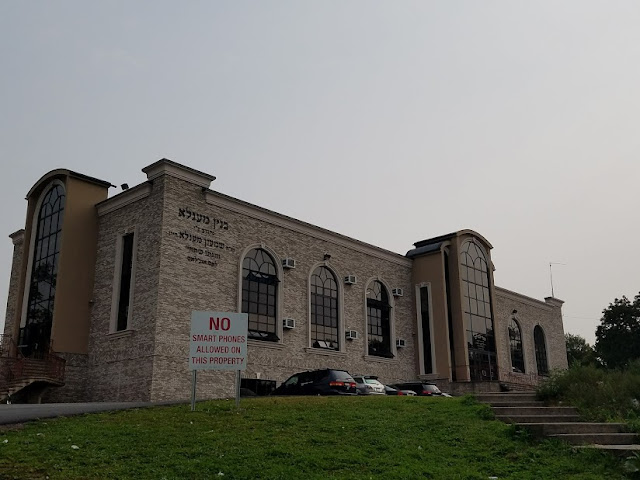The Viznitz kehilla, located in Kiamesha Lake in the Catskills, is seeking to incorporate their own 1.5-square-mile village, to be known as "Village of Ateres."
The proposed community is expected to house over 500 residents, with the majority coming from the Chasidic community.
The kehilla filed a petition for their proposal, asserting that it complies with the area requirements outlined in the New York Village Law, ensuring that the proposed village does not exceed five square miles.
New York law dictates that a public hearing must be held to address any objections to the legal sufficiency of the petition. Therefore the initial legal hurdle to clear was the holding of these public hearings.
At the time, Kehilla members were concerned that Thompson Town Supervisor, Bill Rieber Jr. would deem their petition invalid - which could lead to a legal battle in the court system - after he publicly stated that he’s concerned that the motivation behind the incorporation of the Village of Ateres is so they could gain control over housing regulations, which would permit them to build denser housing upstate as well.
(Of interest is that Viznitz currently has their own Village of Kaser, located in the Monsey area. Viznitz established Kaser in 1990 so they could build denser housing.)
Opponents who spoke at the first hearing objected to adding a new layer of government and found fault with the petition itself, arguing enough of its 99 signatures were flawed to render it invalid.
However, Mr. Rieber, as well as Fallsburg Supervisor Kathy Rappaport did not deem the petition invalid.
In a joint press release, both town supervisors said opponents raised "many well-articulated objections" that they couldn't consider under the state's archaic law for creating villages. "No qualitative or quantitative analysis is even allowed," they lamented.
"Therefore, many of these objections, while full of merit, are not actual reasons for challenge based on the antiquated Village Law," the supervisors wrote.
Now that their review deemed the petition valid, the proposal has formally cleared its first hurdle.
Anyone opposed to the plans now has 30 days to challenge the petition in court.
If no one sues, Rieber and Rappaport would then schedule a referendum for the roughly 320 adults currently living in the proposed village. That vote would likely usher into existence New York's newest municipality.
Ateres is a jigsaw puzzle of properties taking up 929 acres, mostly in Thompson. Its core is a small enclave of about 140 Viznitz families in the Kiamesha Lake area, a year-round settlement that began two decades ago. Surrounding that are hundreds of acres of undeveloped land.
If approved, the new village would have its own leaders and laws, including new zoning to regulate future development.
Zev Tarkletaub, one of the organizers, told the USA Today Network last month that residents sought that step mainly to enhance services that are important to the Hasidic community, such as sidewalks and streetlights for pedestrian safety. Having their own government would ensure those priorities are met, he argued.
He dismissed concerns that a new village with zoning control would foster excessive development, saying that residents moved to Sullivan for its rural character and don't want to live amidst dense housing.
The population of 834 adults and children living in the Ateres area meets one of the state's few requirements for forming a village: that it have at least 500 inhabitants.
Two bills that state lawmakers passed in June would update and expand village incorporation rules, including raising the population threshold to 2,000. If signed into law, either proposal could pose a new obstacle for Ateres as well as the village of Seven Springs proposal in the town of Monroe which surfaced in 2018 and has been tied up in litigation.
Both village incorporation bills were approved in Albany three months ago and are awaiting decisions by Gov. Kathy Hochul to sign or veto them. She has until the end of the year to do so.
In their joint statement, Rieber and Rappaport said the century-old state law for village formations gives no consideration to their future environmental impact, such as water and sewer needs, or other factors like road improvement costs or hiring new municipal employees. It also ignores the fact that New York has been seeking to shed — not add — layers of government by encouraging villages to dissolve or merge.
"Fortunately, the Assembly and Senate agree, having both approved an updated bill which awaits Gov. Hochul’s signature," they wrote. "We are governed by the current law, absent the Governor’s signature."
Viznitz endorsed Hochul in the primary election. However, they distanced themselves from her in the general election race, despite that she personally visited their Askanim during the heat of the race in a bid to gain their support.
However, Skver and Satmar’s Aronim faction (which are both closely related to the proposed Seven Springs village) did strongly support Hochul in the general election race.
To join a FAA News WhatsApp Group, click here.
To join the FAA News WhatsApp Status, click here.


No comments:
Post a Comment